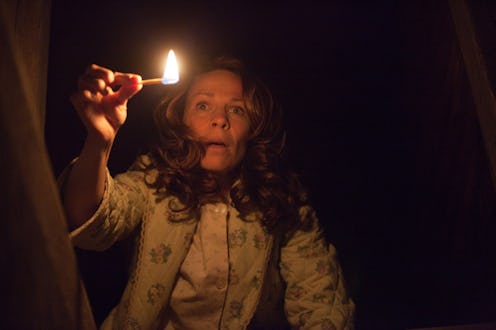
We're totally obsessed with ghost stories. Possessions, hauntings, witches, psychics — we make fun of people who believe in them, but the very second a movie comes out that's "based on a true story" everyone is like I LOVE BEING SCARED, SIGN ME UP, I WANNA WATCH GHOSTS TEAR PEOPLE FROM THEIR BEDS, because this is Amurrica, home of the free and occasionally hypocritical.
Why does the fact that it's "based on real events" somehow make a horror movie that much better? Scott Meslow sums it up in The Week , noting: "The Conjuring outgrossed its far more expensive rivals like R.I.P.D. and Turbo on a marketing campaign that can be boiled down to five words: Based on a true story."
I believe it relates to a super-secret "I've never admitted this to anyone" belief in ghosts. Because if we reaaaallly didn't believe in ghosts, or spirits roaming houses, why would we care whether or not these movies loosely relate to real events? The Blair Witch Project pioneered this marketing approach and advertised the footage as real, even though it was nothing more than a super low-budget thriller. We loved it then, and we love it now, and I'll be the first one to say it: we clearly believe in ghosts.
Despite our holier-than-thou attitudes toward those poor crazy people who openly admit to believing in spirits, we're all kinda in that weird-ass boat. We may pretend to believe the stories aren't true, but we secretly hope they are. Silly though it may be, there really is no point denying our fixation and semi-belief in ghosts and the supernatural, because it's so so obvious that it's a thing. It influences us to go watch these movies over and over again.
Besides, if ghosts do exist, that might mean that magic is real, too, and if magic is real, THEN MAYBE I STILL HAVE A CHANCE TO GO TO HOGWARTS. I'm so into it. And I've got eight Harry Potter movies that grossed over $2.3 billion saying that you are, too.